When choosing the perfect platform that comes with extensive customizability for online businesses, merchants might stuck between Shopware vs Magento. While Shopware boasts an intuitive interface and robust features, perfect for scalable ventures, Magento offers unmatched flexibility and a vast third-party ecosystem, ideal for those seeking complete control.
If you are not sure which platform to go for, you’ve reached the right resources! In this article, LitExtension – #1 eCommerce Migration Service will help you pick out the most suitable option by going through the following key points:
- The overview of Magento 2 vs Shopware;
- Detailed comparison between two platforms;
- Our methodology to compare Magento vs Shopware.
Without further ado, let’s dive right in!
Shopware vs Magento: Key Takeaways
- The two platforms are both leading eCommerce platforms that many businesses trust for their online stores. Each has its own set of standout qualities.
- Shopware shines with its focus on marketing, a friendly interface that’s easy to use, and customization that doesn’t require much technical know-how. It’s a favorite in German-speaking areas and fits perfectly with business-to-customer (B2C) sales models.
- Magento sets the bar high with powerful tools, the ability to grow with your business, and deep customization options. It’s particularly strong in search engine optimization (SEO) and marketing, making it the go-to for bigger companies.
- When it comes to cost, Shopware and Magento offer different starting points. The best choice for you will hinge on how much you’re willing to spend and the features you need for your business.
Magento 2 vs Shopware: At A Glance
Shopware overview
Shopware, a prominent player in the eCommerce platform landscape, has a 19-year history in the market. As an open-source solution, it provides flexibility and easy customization for online stores.

What sets Shopware apart is its marketing-oriented approach. It is designed to support businesses aiming to enhance their brand awareness through storytelling and the creation of unique shopping experiences. Particularly well-suited for B2C models, Shopware has become a preferred choice for fashion, art, and lifestyle industries seeking an ideal online presence.
Magento overview
Despite being around since 2007, Magento (Adobe Commerce) continues to maintain its global influence. This top open-source e-commerce platform stands out for its strong capabilities and adaptability. Supported by a global network of 150,000 developers and over 300 highly-trained solution partners, Magento primarily serves large businesses with significant online sales.

This platform covers all aspects of business operations, including inventory management, marketing tools, and report analysis. To enhance customer satisfaction during the shopping experience, Magento offers options for custom products and rule-based merchandising.
The strength of Magento lies in its scalability and customization capabilities. Yet, these benefits are accompanied by a challenging learning process, particularly for those without technical expertise, owing to the significant coding involved.
Magento is available in 2 distinct editions:
- Magento Open Source (previously known as Community Edition): Designed for small to medium-sized businesses.
- Adobe Commerce Cloud Edition: Tailored for larger enterprises.
Shopware and Magento 2: The similarities
Shopware and Magento 2 share common features that appeal to businesses setting up online stores. Both are open-source, offering customization freedom and control over store functions. Shopware is more user-friendly, while Magento offers advanced options for developers.
Their active communities provide plugins that improve the platform’s features, enhancing platform capabilities. Both come with comprehensive eCommerce tools, like product management, marketing automation, and SEO, to ensure your store’s success. Being scalable, they help handle growing traffic and sales, perfect for any business size.
Besides, when it comes to keeping customer information safe, both platforms are committed to top-notch security. For example, Magento is well-regarded for its security, with a team that’s always rolling out new updates and fixes.
That covers their similarities. Now, let’s explore how they differ. If you’re someone who grasps concepts quickly, have a glance at the following comparison table to understand the competition between Magento vs Shopware.
[wptb id=72934]
Shopware vs Magento: Pricing Plans
Shopware and Magento both have varied pricing options tailored to the features they offer. Here’s an essential comparison to guide your decision:
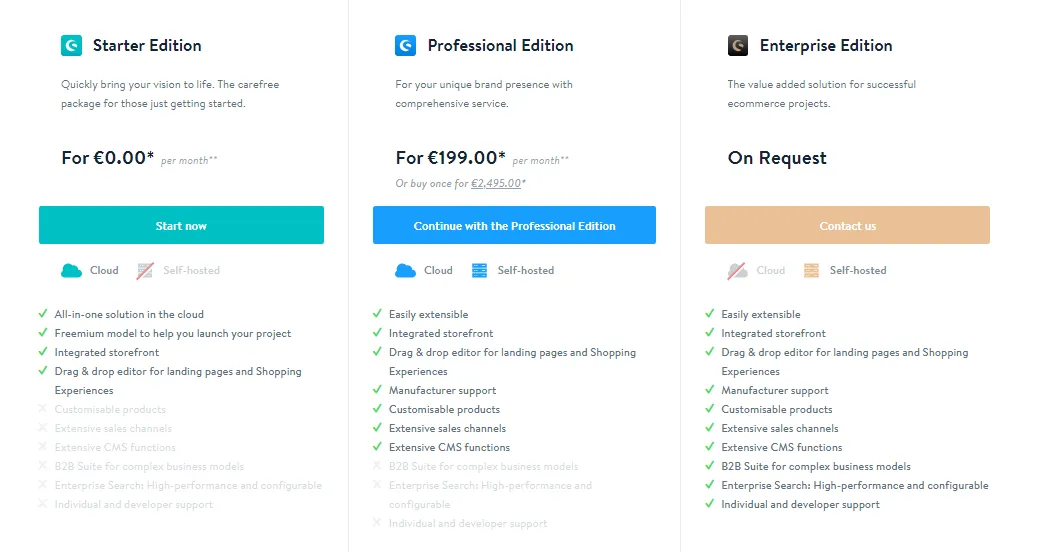
Starter/Budget: Shopware provides a free Starter Edition for newcomers to get acquainted with the platform. On the other hand, Magento also comes with an open-source version (Magento Community Edition – Magento CE) that is completely free to install. However, you still need to pay for hosting, domains, SSL, development, themes, and add-ons.
- Web hosting ($9.95 – $29.95/month);
- Domain Cost ($10 – $20/year);
- SSL Certificate Cost ($0 – $600/year);
- Magento Developer Cost ($65 – $150/hour);
- Themes ($17 – $5,000+);
- Extensions and Add-ons ($0 – $2,000+).
Mid-Range: Shopware’s Professional Edition (€199 per month or approximately $213.43 per month) is designed for growing businesses, offering more advanced features. On the other hand, Magento’s pricing in this range can differ widely. Depending on the business’s size and needs, Magento Commerce’s pricing starts at $1,999 per month.
Enterprise: Shopware offers an Enterprise Edition option for large businesses with intricate requirements. It includes all the advanced features of the Professional package, plus 24/7 customer support, a dedicated account manager, and a B2B suite. The one-time fee is €39,995 ($42,730), or €2,495 ($2,666) per month.
Meanwhile, Magento’s enterprise solution, Magento Commerce Cloud, costs between $40,000 and $190,000 a year, depending on the specific tier and features selected. Of course, it is packed with extensive features for large-scale operations.
[wptb id=74208]
Quick Verdict
Shopware pricing is more accessible for startups and small businesses with its free Starter Edition. Meanwhile, Magento caters to mid-range and enterprise-level businesses with its Commerce and Cloud editions, offering extensive features at a higher cost.
Shopware vs Magento: Hosting Requirements
Hosting requirements directly impact your website’s performance and scalability. Let’s compare the hosting specifications for both platforms:
- Operating system: Shopware operates on a Linux-based server, while Magento requires Linux x86-64.
- Web server: Shopware is compatible with Apache 2.2 or 2.4 and Nginx 1.6 or newer. Magento works with Apache 2.2 or 2.4 and Nginx 1.8 or newer.
- Database: Shopware needs MySQL 5.6.4 or later. Magento supports MySQL 5.6, 5.7, as well as MariaDB and Percona databases.
- PHP: Shopware requires PHP 7.2.11 or above. Magento can run on PHP 7.1.3 or above.
- Memory requirement: Shopware requires a minimum of 8GB of memory, whereas Magento needs at least 2GB for development purposes.
When it comes to hosting requirements, Shopware may have an edge for businesses looking for a platform with a more modern stack and higher base memory requirement. This could imply better performance and scalability out-of-the-box. On the other hand, as one of Shopware competitors, Magento offers flexibility with a lower memory requirement for development, making it accessible for a wider range of hosting environments.
Quick Verdict
When comparing Shopware vs Magento in terms of hosting, it’s clear that Shopware outperforms its competitor.
Shopware vs Magento: Ease Of Use
Magento comes packed with a wider array of capabilities. However, for those who aren’t tech-savvy, it might be a bit challenging to use without some technical know-how. Managing page layouts can be more complex as it involves coding.
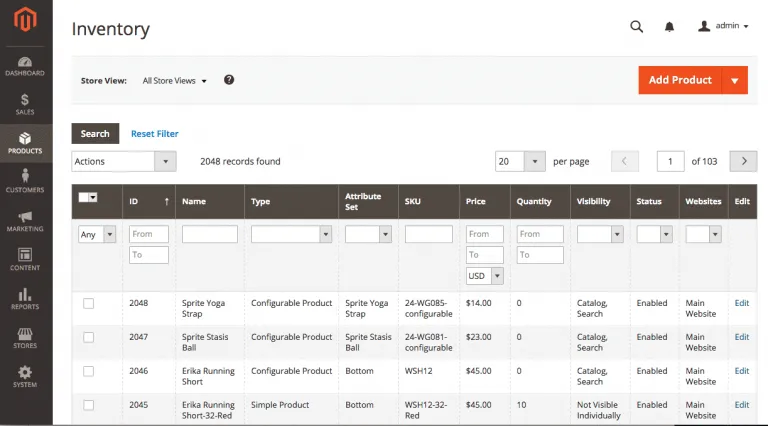
On the other hand, Shopware is celebrated for its straightforward design and easy-to-use options, making it a breeze for store owners without technical skills to run their online stores. It’s an excellent option if you want an uncomplicated setup with minimal coding involved.
Quick Verdict
Shopware is definitely a better fit if you prefer an intuitive platform without the need for extensive coding.
Shopware vs Magento: Customizability
Indeed, Shopware and Magento are adaptable platforms that offer a wide range of personalization features to cater to the distinct requirements of digital shops.
Magento is popular among developers for its extensive customization options. It has a strong foundation and a versatile codebase, allowing developers to craft specialized solutions for their customers. Whether it’s creating bespoke themes or crafting unique plugins, Magento gives developers the tools they need to realize their creative ideas.
In contrast, Shopware focuses on ease of use while still providing plenty of customization choices. Its user-friendly backend interface lets even those with minimal technical skills make adjustments without needing to code.
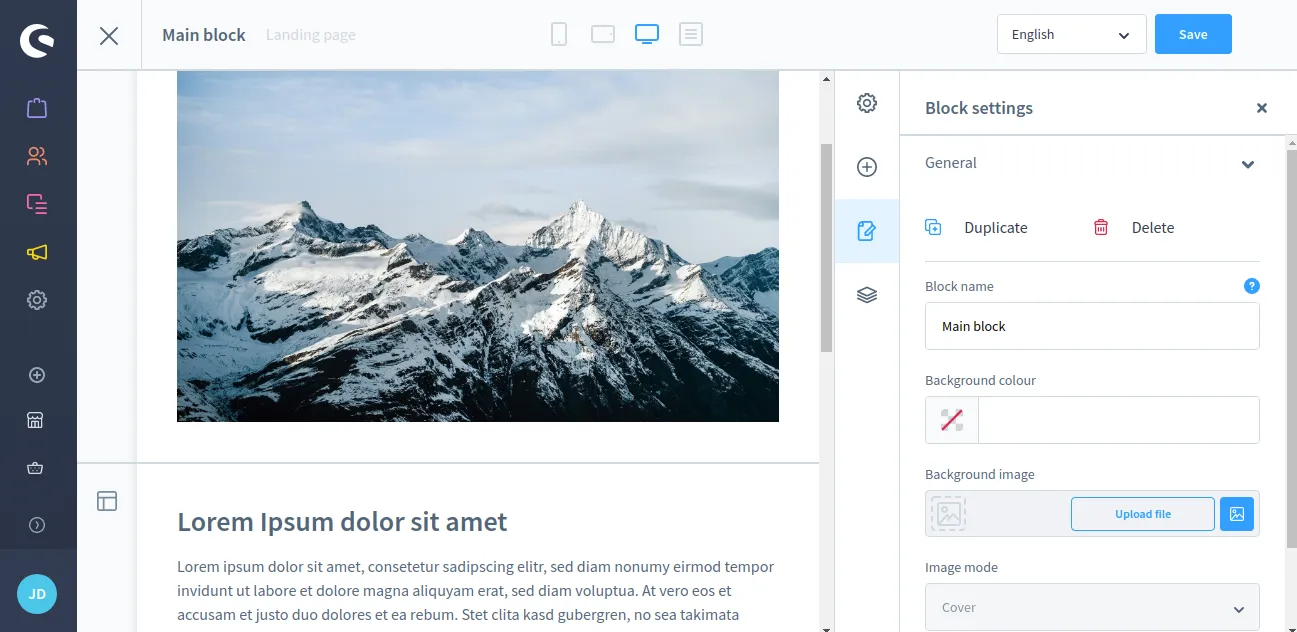
Shopware’s “Shopping Worlds” feature includes a drag-and-drop tool that makes it simple to design landing pages with customizable components such as image sliders, banners, and product showcases.
Quick Verdict
Magento offers more customizability than Shopware, making it an attractive Shopware alternative for tech-savvy retailers.
Shopware vs Magento: SEO & Marketing
Shopware’s SEO setup lays a strong foundation for good Google rankings and includes robust tools for boosting sales. The platform is pre-configured for SEO but allows custom adjustments. Its “Storytelling” feature creates a unique, genuine feel, enhancing the shopping journey by revealing more product details through interactive images, leading to a pleasant user experience and improved site usability.
On top of that, Shopware also offers SEO plugins like the SEO Professional plugin (€249 or approximately $267.13) for traffic and conversion enhancement, combining numerous SEO features.
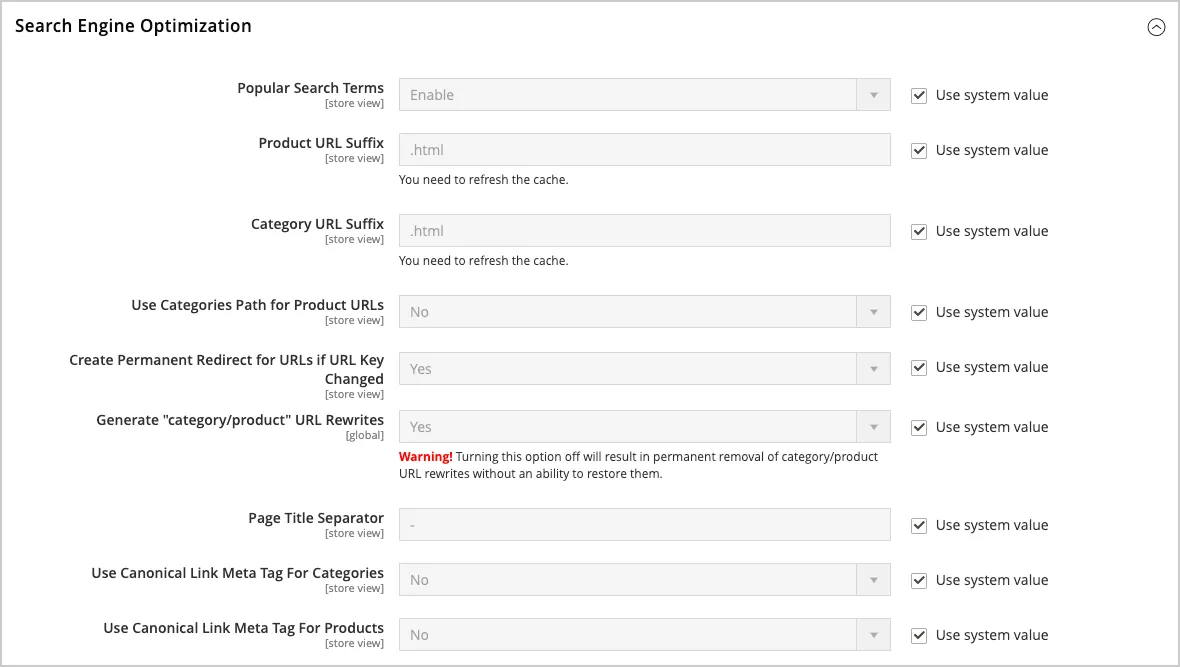
In comparison, Magento provides a comprehensive suite of features to foster customer relationships and increase traffic, including customizable coupons and reward points to incentivize repeat purchases. Magento’s marketing capabilities vary with the chosen plan, but even Magento Open Source users can find SEO & Marketing plugins in the Magento Marketplace, with 469 options ranging from free to $999.
The SEO Suite Ultimate ($299) is notable for its extensive on-page SEO tools, tackling duplicate content, site indexation, URL optimization, and metadata, along with advanced sitemaps, cross-linking, SEO redirects, and rich snippet options.
Quick Verdict
When it comes to SEO & marketing features, Magento tends to offer more control over SEO elements and a wider array of marketing tools.
Shopware vs Magento: eCommerce features
To help you better compare Shopware vs Adobe Commerce, we’ve organized the key aspects of their eCommerce features in the table below.
[wptb id=72935]
Quick Verdict
Magento stands out regarding eCommerce features. It offers advanced SEO features, email outreach, customer segmentation, and bespoke shopping journeys, making it a robust choice for online businesses.
Shopware vs Magento: Scalability & Integration
Shopware, popular in German-speaking regions, has over 3,500 modules with prices ranging from €0 to €7,990. They are mostly in German, reflecting its European focus. This could limit options for specific needs outside Europe.
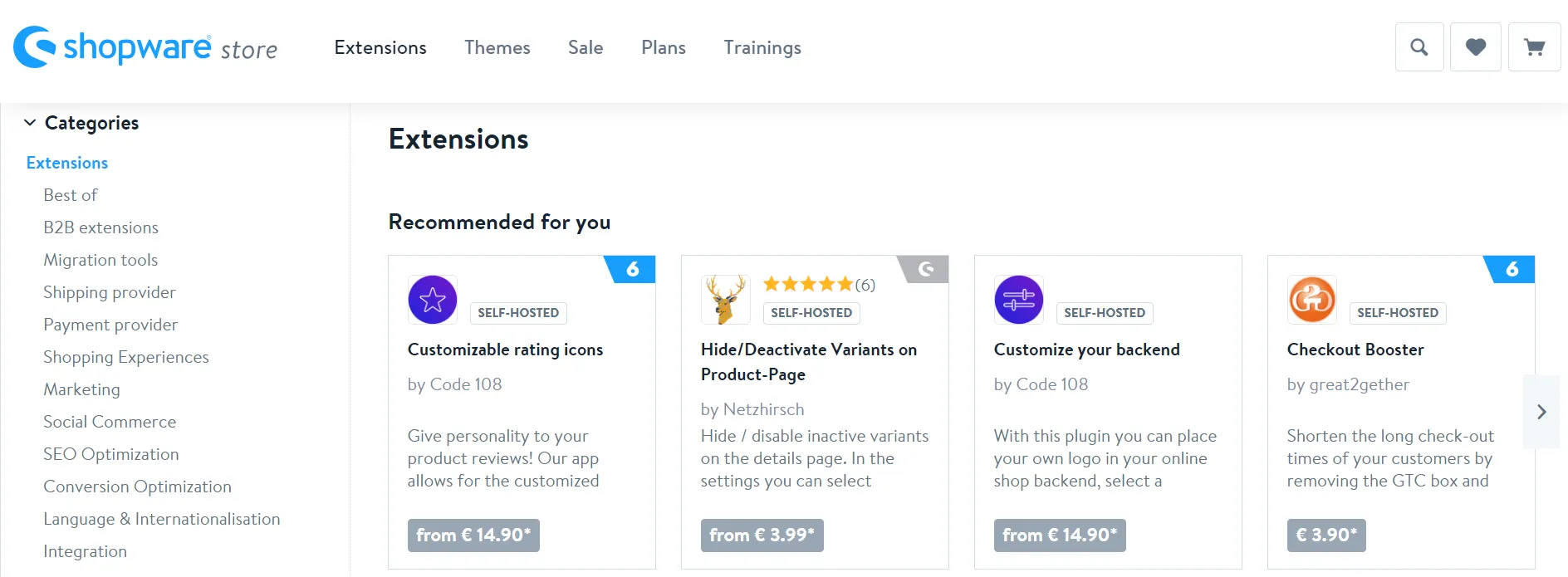
On the other hand, Magento 2 is expanding with over 3,400 extensions across various categories. It has improved module compatibility, reducing conflicts seen in Magento 1. Like Shopware, Magento offers both free and priced extensions. Prices for the latter range from $40 to $10,000 or even higher, depending on the desired features.
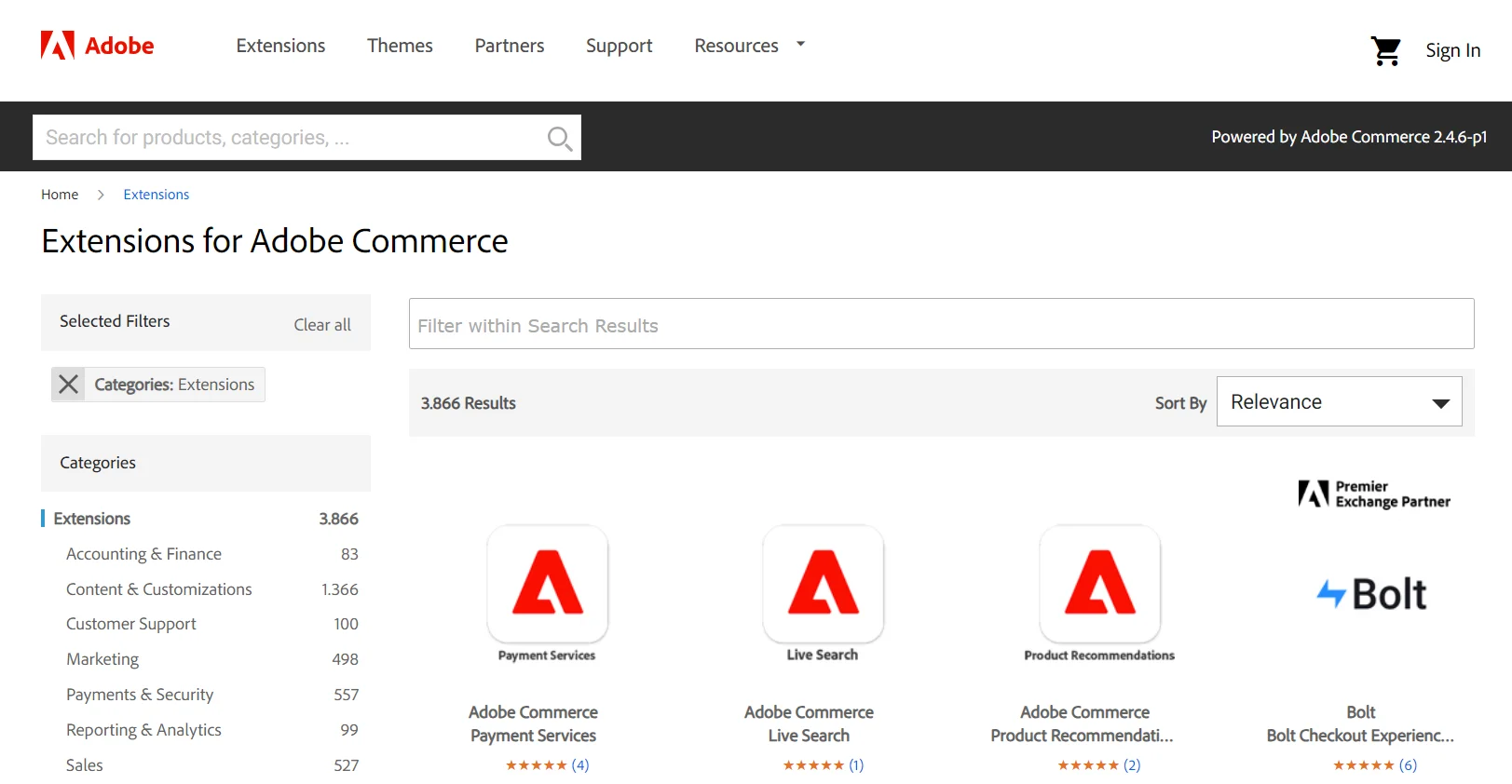
Quick Verdict
Magento generally takes the lead. It is known for its robust features and flexibility, making it suitable for large-scale eCommerce businesses that require extensive customization and integration capabilities.
Shopware vs Magento: Community & Support
Shopware offers customer support at a monthly fee, providing good value with access to a technical account manager for various queries and issues. Its forum is exclusively in German, which might be challenging for non-German speakers. That said, Shopware’s academy offers live training, webinars, and certification programs.
For Magento, newcomers might assume it has top-notch customer support. Yet, Magento lacks direct support options like live chat, phone, or email for its users. You’ll likely need to handle technical issues on your own unless you opt for Magento Commerce Cloud.
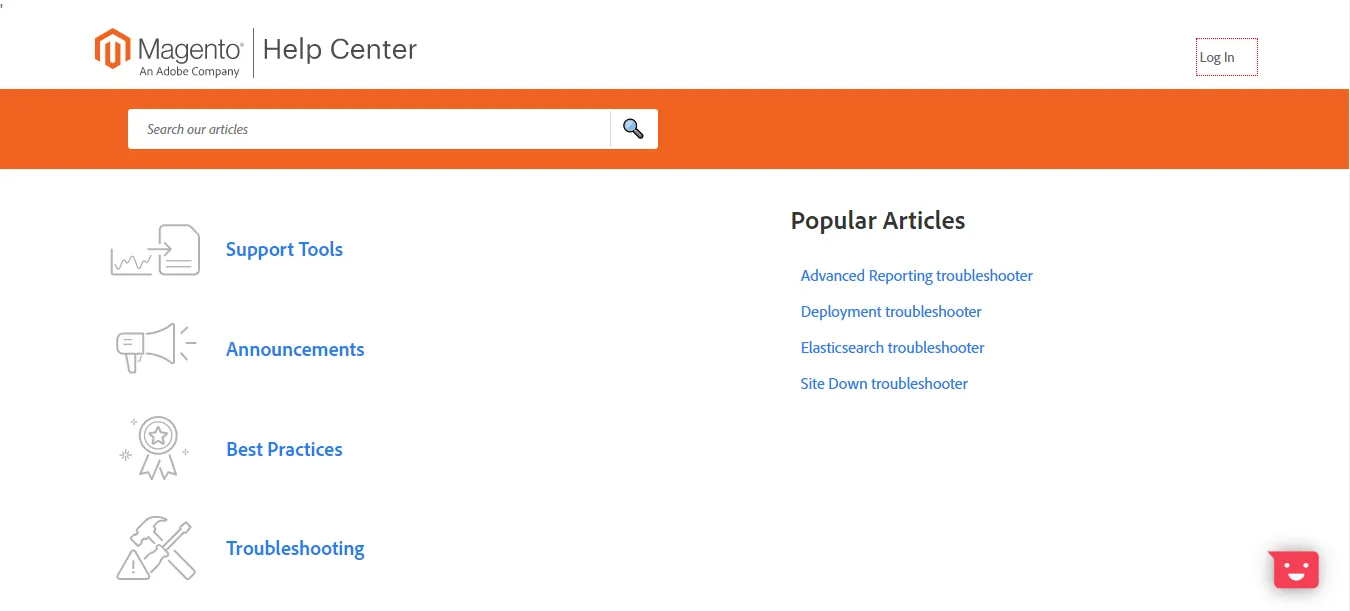
However, Magento compensates with a wealth of resources such as blogs and forums filled with helpful tips and insights. Plus, connecting with other merchants can be a great way to deepen your understanding of the platform.
Quick Verdict
When it comes to customer support, Shopware outshines Magento due to its dedicated assistance system. In terms of community, Magento takes the lead with its vast network of developers, partners, and support forums.
Shopware vs Magento: Performance and Security
When weighing your options between Magento vs Shopware, reflect on what you specifically require. Magento is famous for handling high volumes of traffic and sales without a hitch, making it a go-to for big online shops.
Meanwhile, Shopware boasts a fresh and efficient design that delivers top-notch performance. It uses the latest tech like Elasticsearch to make searching for products super quick.
Quick Verdict
Magento has the edge in scalability and handling high traffic volumes, while both platforms are committed to robust security measures.
Shopware vs Magento Comparison: Our Methodology
In our effort to offer a clear and honest comparison of Shopware vs Magento, we follow a detailed approach that reflects our 10-year experience helping thousands of merchants migrate between different eCommerce platforms.
Our approach focuses on key criteria such as ease of use, value for money, scalability, built-in features, extensions, security, and support. This holistic evaluation ensures that we offer insights that are not only informative but also actionable. As a result, we aim to help you make the best decision for your unique business needs.
Additionally, our comparative analysis begins with an in-depth market research phase, where we immerse ourselves in the latest eCommerce trends and technologies. We then create demo stores on both Shopware and Magento, allowing us to experience firsthand the user interface, performance, and overall merchant and customer journey. This practical assessment is key to grasping the subtle differences between each platform and determining how they can meet the needs of businesses of various sizes and types.
Finally, we compare Shopware vs Magento side by side, looking at each one’s unique community, the variety and excellence of their add-ons, and the customer support they offer. We shape our content to simplify complex parts into stories that are easy to understand and interesting, making sure you stay informed with up-to-date and applicable knowledge in the fast-changing world of online business.
Shopware vs Magento: FAQ
[sp_easyaccordion id=”72936″]
Conclusion
Choosing the right platform is crucial for managing your business with efficiency and agility. Shopware vs Magento stand out, each with its set of unique features tailored to different business needs.
Shopware shines as the go-to platform for small to medium-sized businesses, offering ease of use and affordability without compromising on functionality. On the flip side, Magento caters to those looking to scale up their operations. It’s an ideal match for businesses ready to invest in a platform rich in eCommerce features, supporting extensive growth and expansion.
If you’re contemplating a transition between these platforms, whether it’s Shopware Magento migration or Magento Shopware migration, LitExtension is your right partner. Our migration service guarantees a swift, secure, and precise transfer of your valuable data. For further details, feel free to contact us!
Join our Facebook Community and follow our blog for more eCommerce tips and news.